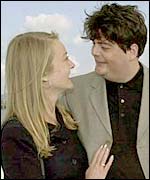The BBC report after David Shayler’s conviction in November 2002:
Former MI5 agent David Shayler is facing jail after being convicted of revealing security secrets.
Shayler, 36, was found guilty on three charges of breaking the Official Secrets Act.
He revealed secret documents to the Mail on Sunday newspaper in 1997, arguing he had a public duty to expose malpractice within the security services.
But the prosecution argued Shayler, who will be sentenced on Tuesday, had potentially placed the lives of secret agents at risk. It said he betrayed a “life-long duty of confidentiality” by revealing classified matters.
Shayler, who represented himself, also told the Old Bailey jury he feared for his life at the time, because of something “far more serious” than anything published in the paper. Shayler was remanded on bail for sentencing and could face up to two years’ imprisonment on each of the three counts.
Shayler copied 28 files on seven topics before leaving MI5 in October 1996.
‘Incompetence’
Soon after, he accused MI5 of incompetence and leaked sensitive information to the Mail on Sunday, including allegations of financial links between the Provisional IRA and Libya. He then fled to France with the £40,000 he earned from his revelations, but returned to Britain after three years knowing he faced arrest.
 Outside court Shayler’s girlfriend Annie Machon — also a former MI5 officer — said: “David is a whistle-blower, pure and simple. I’m shocked at the verdict. He deserves to be protected, not prosecuted. David revealed malpractice, crime and incompetence on behalf of the intelligence service and he did it in the public interest. He still believes it was right to do so. We believe judges in Europe will be more sceptical about the Official Secrets Act in this country.”
Outside court Shayler’s girlfriend Annie Machon — also a former MI5 officer — said: “David is a whistle-blower, pure and simple. I’m shocked at the verdict. He deserves to be protected, not prosecuted. David revealed malpractice, crime and incompetence on behalf of the intelligence service and he did it in the public interest. He still believes it was right to do so. We believe judges in Europe will be more sceptical about the Official Secrets Act in this country.”
John Wadham, director of civil rights group Liberty and also Shayler’s solicitor, said they would consider taking the case to appeal and would continue their application to the European Court of Human Rights.
Pre-trial ruling
Maurice Frankel from the Campaign for Freedom of Information, said there needed to be fundamental changes to the way in which such cases were dealt with.
A House of Lords hearing before the trial ruled that Shayler could not reveal details of the “serious” matter that allegedly put his life in danger. It also refused him permission to argue his case with a “public interest defence” under the European Charter of Human Rights.
 But following the conviction, Liberal Democrat home affairs spokesman Simon Hughes said: “Whatever the rights and wrongs of Mr Shayler’s actions, there should be a change in the law to ensure that a public interest defence can be undertaken.”
But following the conviction, Liberal Democrat home affairs spokesman Simon Hughes said: “Whatever the rights and wrongs of Mr Shayler’s actions, there should be a change in the law to ensure that a public interest defence can be undertaken.”
During the trial, Nigel Sweeney QC, for the Crown, said disclosure of even one piece of classified information could be the “final piece in the jigsaw” allowing hostile countries or organisations to identify British agents.
Mr Sweeney told the trial: “The nation’s agents may be unmasked.”
But Shayler told the court: “I was seeking to expose the truth.
‘No harm’
“I’m not the first person in history to stand up and tell the truth and be persecuted, and I doubt I’ll be the last.
His argument that no agents’ lives were put at risk was dismissed as “irrelevant” by the judge.
The jury was told current legislation allowed alternative action for whistle-blowing, such as telling the police or a government minister, instead of going to the media.
Jurors were allowed to see the weighty file of secret documents — but the names of agents and other ultra-sensitive information was obscured.
